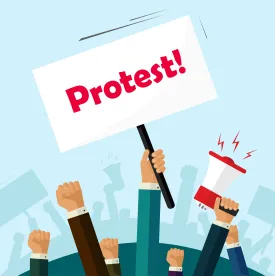In this increasingly polarized and highly charged political environment, an employer may face challenges in determining how to maintain a professional atmosphere and further its business interests without infringing on its employees’ rights to express their views on a wide range of political and social issues. There are, however, some best practices that employers can follow in navigating the potential minefield of managing their employees’ political and social activism in the workplace.
Know—and Train Managers About—Applicable Laws
Employers should be aware that regulating their employees’ political speech and activity can implicate legal liability concerns in several respects. As we have explained previously, the General Counsel of the National Labor Relations Board (“NLRB” or “Board”) has issued a “Guidance Memorandum” concluding that employee action to “improve their lot as employees through channels outside the immediate employee-employer relationship” is protected concerted activity under Section 7 of the National Labor Relations Act (“NLRA”), so long as it has a direct connection to the employees’ working conditions. In some circumstances, therefore, an employer could face an unfair labor practice (“ULP”) charge if it punishes employees who skip work to attend a pro-immigration rally—but takes no action against other employees who call out on a sunny summer Friday to head to the beach.
Moreover, although there is no federal law that prohibits discrimination against private-sector employees based on their political activity or affiliation, many states (including California and New York) and the District of Columbia do have such laws. Several states also have laws that protect employees from discrimination or harassment based upon their lawful off-duty conduct, which would extend to their off-duty political activity or social activism. In California, for example, an employer cannot discriminate or retaliate against employees because of their off-duty lawful political activities. Similar legal protections exist in several other states, including Colorado, Louisiana, and New York.
An employer must, therefore, train supervisors and managers on what they can—and cannot—do when employees engage in political activity that may impact the workplace. The employer must also ensure that such training addresses any applicable state-specific limitations and requirements.
Apply Work Rules in a Neutral, Consistent Manner
Employees’ political or social activism may be exhibited in a variety of ways that impact the workplace, such as through unexcused absences (so that an employee can attend a protest or rally, for example), dress code infractions (when employees wear all red, instead of the required black attire), or violations of the cell phone use policy (by employees who use their phones to tweet in support of social causes while on the work floor during a work shift). The best way for employers to manage these issues, and to remain legally compliant, is to apply work rules and policies consistently.
For example, if an employer regularly applies its attendance policies to discipline employees for unexcused absences, the employer need not refrain from disciplining an employee who skipped work to attend a political rally. Similarly, an employer that consistently prohibits its employees from using their cell phones to access social media during their work shift does not have to allow those employees to tweet in support of a political cause on work time. If, however, that employer sometimes lets its employees off the hook for unexcused absences, or occasionally allows employees to use their cell phones to surf Facebook while on the work floor, it should be wary of applying its work rules to penalize employees who are absent or using their cell phones during work time to support a political or social cause.
The safest course for employers is to apply their work rules neutrally and avoid penalizing groups of employees based on the “message” of the political or social cause that those employees choose to support. An employer that declines to discipline an employee for taking an unscheduled day off to attend a pro-choice rally, for example, may trigger a discrimination claim if it then disciplines a different employee for taking an unscheduled day to attend a pro-life event. Understanding that the line between political speech and protected comments related to terms and conditions of employment may sometimes be hard to draw, employers can help ensure that employees’ discussions about politics don’t get out of hand by neutrally enforcing work rules and policies that prohibit fighting, bullying, or harassment, and that prohibit employees from engaging in conduct that is loud or distracting or that otherwise impinges upon productivity.
Conclusion
Our tumultuous political and social environment does not show any signs of cooling down in the near future. Therefore, an employer needs to be prepared to address and manage its employees’ political and social activism to protect and further its business interests while ensuring that its employees’ rights and morale do not suffer.



 />i
/>i

